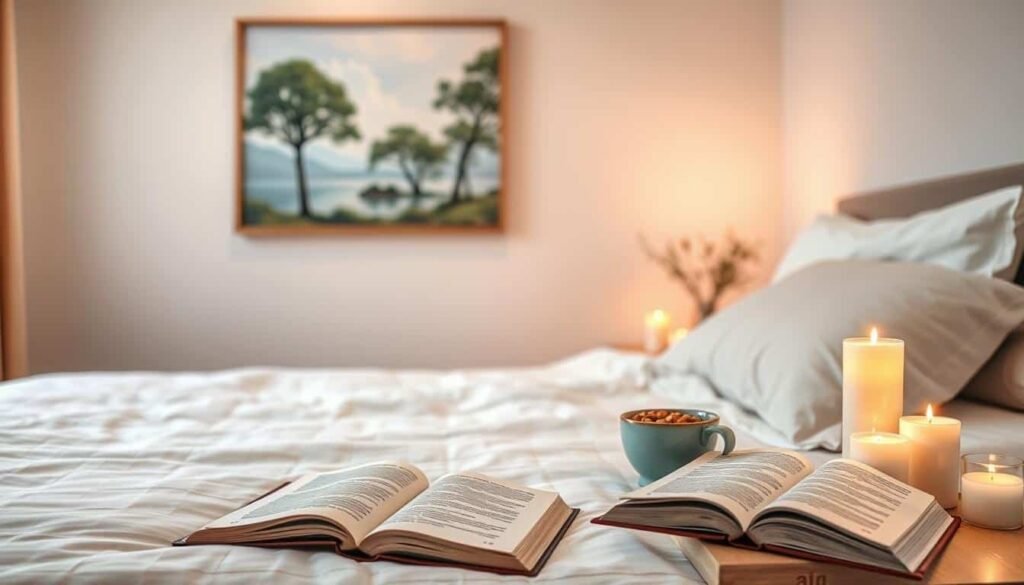(Hey! Some links in this post may be affiliate links — meaning I may earn a small commission if you buy through them, at no extra cost to you. As an Amazon Associate, I earn from qualifying purchases. I only share products I genuinely love and think you’ll find useful too. Read the full disclosure here).
Establishing a calming evening routine can profoundly impact the quality of your day, improving sleep, reducing anxiety, and increasing productivity. The key is to set a daily reminder for your bedtime routine, which should begin a few hours before actual sleep time. This routine should include turning off access to news and social media, performing skincare and hygiene, lowering lights, changing into pajamas, and engaging in relaxing activities like meditation or reading.
Contents
- 1 The Importance of a Calming Evening Routine
- 2 Assessing Your Current Evening Habits
- 3 Setting the Atmosphere for Relaxation
- 4 Mindfulness Techniques to Incorporate
- 5 Unplugging from Technology
- 6 Creating a Pre-Sleep Routine
- 7 Incorporating Gentle Movement
- 8 Nutrition for a Peaceful Evening
- 9 Establishing a Sleep Environment
- 10 Evaluating Your Evening Routine Regularly
- 11 FAQ
- 11.1 What are the key components of a calming evening routine?
- 11.2 How can a consistent evening routine benefit mental health and productivity?
- 11.3 How can you create a relaxing atmosphere for your evening routine?
- 11.4 What mindfulness techniques can be incorporated into an evening routine?
- 11.5 How can you reduce screen time before bed to improve sleep quality?
- 11.6 What are some tips for creating an effective pre-sleep routine?
- 11.7 How can gentle movement be incorporated into an evening routine?
- 11.8 What types of foods and drinks can promote relaxation in the evening?
- 11.9 What factors should be considered when establishing a sleep-friendly environment?
- 11.10 How can you regularly evaluate and adjust your evening routine for optimal results?
Key Takeaways
- Implement a calming evening routine to improve overall well-being
- Incorporate relaxation exercises and stress relief techniques into your routine
- Start your evening routine 1-2 hours before bedtime for maximum benefits
- Unplug from digital devices and create a soothing environment for better sleep
- Prioritize self-care activities like skincare, meditation, and gentle movement
The Importance of a Calming Evening Routine
Establishing a consistent evening routine goes beyond just promoting better sleep. It offers a soothing rhythm to the end of the day, calming the mind and simplifying habit formation. From improved mental health to enhanced sleep quality and a more productive start to the next day, the benefits of a calming evening routine are far-reaching.
Benefits for Mental Health
Disconnecting from work and other responsibilities signals to your body that it’s time to relax, promoting a healthy work-life balance and preventing burnout. Mindfulness practices, such as deep breathing exercises or guided meditation, can help alleviate stress and cultivate a sense of inner peace before bed.
Impact on Sleep Quality
Maintaining a consistent sleep preparation routine reinforces the body’s circadian rhythm, aiding in getting enough REM sleep and reducing the chances of sleep disorders like insomnia. Engaging in bedtime rituals like reading, journaling, or gentle yoga can induce a state of relaxation, leading to better quality sleep.
How It Sets Up Your Next Day
A well-structured evening routine sets the stage for a more productive and energized start to the following day. By winding down and disconnecting from digital distractions, you can wake up feeling refreshed and focused, ready to tackle the day’s tasks with clarity and efficiency.
“Just a few minutes of reading can significantly reduce stress levels, contributing to better bedtime routines.”
Assessing Your Current Evening Habits
Before you can create a calming evening routine, it’s essential to evaluate your current habits and identify any areas for improvement. Take a moment to reflect on your typical evenings – what are the stress triggers and unproductive activities that may be hindering your ability to [https://vitallifetips.com/how-to-create-a-bedtime-routine-that-works-for-your-baby/ unwind]?
Identifying Stress Triggers
Common stress triggers during the evening hours can include working late, excessive [https://vitallifetips.com/how-to-create-a-bedtime-routine-that-works-for-your-baby/ screen time], and poor time management. Consider writing down your daily accomplishments and challenges to better understand the sources of your stress. This exercise can help you pinpoint specific areas to address in your new evening routine.
Evaluating Time Management
Effective time management is crucial for creating a calming evening. Assess how you currently spend your time after work or school. Are you dedicating enough time to [https://vitallifetips.com/how-to-create-a-bedtime-routine-that-works-for-your-baby/ unwinding activities] and [https://vitallifetips.com/how-to-create-a-bedtime-routine-that-works-for-your-baby/ stress relief techniques]? Consider setting a specific start time for your evening routine, such as 7:15 PM, to help establish structure and prioritize self-care.
Recognizing Unproductive Activities
Identify any activities or habits that may be preventing you from fully relaxing in the evenings. This could include mindless scrolling on your phone, binge-watching television, or engaging in activities that leave you feeling drained rather than rejuvenated. By recognizing these unproductive behaviors, you can make intentional changes to create a more calming and restorative evening experience.
“Consistency in maintaining an evening routine is crucial for reaping the benefits associated with structured activities before bed.”
By taking the time to assess your current evening habits, you’ll be better equipped to create a personalized routine that promotes [https://vitallifetips.com/how-to-create-a-bedtime-routine-that-works-for-your-baby/ unwinding] and [https://vitallifetips.com/how-to-create-a-bedtime-routine-that-works-for-your-baby/ stress relief]. This process will set the foundation for a more peaceful and productive night’s sleep.
Setting the Atmosphere for Relaxation
As the day winds down, it’s important to create a calming evening routine that helps your body and mind transition into a state of relaxation. One key aspect of this is setting the right atmosphere in your living space. By making a few simple adjustments, you can transform your environment into a soothing oasis that sets the stage for a restful night’s sleep.
Choosing the Right Lighting
Dimming the lights or using warm, low-wattage bulbs can mimic the natural day-night cycle and signal to your body that it’s time to wind down. This subtle shift in lighting helps produce melatonin, the hormone that regulates your sleep-wake cycle. Avoid bright, harsh lights, which can be overstimulating and disrupt your calming evening routine.
Incorporating Soothing Scents
Aromatherapy can play a powerful role in creating a relaxing ambiance. Consider using a diffuser or room spray to fill your space with calming essential oils like lavender, chamomile, or ylang-ylang. These natural scents can help soothe the senses and promote feelings of tranquility.
Creating a Comfortable Space
Take a few minutes each evening to tidy up your living area, ensuring you wake up to a clean and inviting environment. Adjust the thermostat to a cooler temperature, as studies show that a slightly cooler room can enhance sleep quality. Incorporating soft textures, such as plush blankets or pillows, can also contribute to a cozy, calming evening routine.
By thoughtfully curating your surroundings, you can set the stage for a peaceful transition into sleep and set yourself up for a more restful and rejuvenating night. Remember, small changes can make a big difference in creating the ideal atmosphere for relaxation exercises and a good night’s rest.
Mindfulness Techniques to Incorporate
Incorporating mindfulness practices into your evening routine can be a powerful way to prepare your mind for restful sleep. By engaging in activities like deep breathing exercises, guided meditation, and journaling, you can significantly reduce stress and cultivate a sense of calm as you wind down for the night.
Deep Breathing Exercises
Start your mindfulness routine with deep breathing exercises. Focus on inhaling for 7 seconds, holding for 4, and exhaling for 8 seconds. This rhythmic breathing pattern can help activate the parasympathetic nervous system, promoting relaxation and reducing anxiety.
Guided Meditation Ideas
Explore guided sleep meditation videos that can be as short as one minute. These audio or video recordings often feature soothing voices and calming music, guiding you through a meditative experience to quiet your mind and prepare your body for sleep.
Journaling for Reflection
- Use a journal to reflect on your day, expressing gratitude and clearing your mind of any lingering thoughts or worries.
- This writing practice can help you process emotions, gain clarity, and let go of the day’s stressors before bed.
Incorporating these mindfulness practices into your evening routine can significantly improve your sleep quality and overall well-being. By taking a few moments to pause, breathe, and reflect, you’ll be better equipped to transition into a restful and rejuvenating night’s sleep.
“Mindfulness has been shown to be as effective as other highly recommended treatments for insomnia. Consistency in practicing mindfulness for sleep regularly can enhance its effectiveness.”
Unplugging from Technology
In today’s digital age, it’s no secret that our reliance on technology can significantly impact our nighttime self-care routine and stress relief techniques. The blue light emitted from our devices can suppress the production of melatonin, a hormone that regulates our sleep-wake cycle, making it harder to fall and stay asleep. Moreover, the constant stimulation from social media and other online activities can keep our brains active, making it challenging to wind down and relax before bed.
The Effects of Screen Time on Sleep
Numerous studies have shown that blue light from devices can disrupt natural sleep patterns. This type of light exposure can suppress the production of melatonin, making it harder to fall asleep and stay asleep throughout the night. As a result, poor sleep quality can lead to increased stress, anxiety, and overall poor mental health.
Tips for Digital Detox Before Bed
- Set a specific “technology curfew” each night, such as turning off devices at least an hour before bedtime.
- Use blue light filtering apps or settings on your devices to minimize the impact of blue light exposure.
- Designate the bedroom as a tech-free zone, keeping electronic devices out of the sleeping area.
Alternative Evening Activities
Instead of relying on technology before bed, consider engaging in more calming and restorative activities to wind down. Some options include reading a book, listening to relaxing music or nature sounds, or practicing gentle yoga or light stretching. These alternative activities can help promote relaxation, reduce stress, and improve sleep quality.
“Creating a relaxing environment and engaging in calming activities before bed can help improve sleep quality.”
By unplugging from technology and focusing on your nighttime self-care routine, you can better manage stress and set the stage for a more restful and restorative night’s sleep.
Creating a Pre-Sleep Routine
Establishing a consistent pre-sleep routine is crucial for signaling to your body that it’s time to wind down and rest. This routine should include a series of relaxing activities that help you transition from your day to a peaceful night’s sleep. By following a predictable pattern, you can train your mind and body to associate these activities with sleep, making it easier to fall asleep and stay asleep throughout the night.
Relaxing Activities to Wind Down
Consider incorporating some of these calming bedtime rituals into your pre-sleep routine:
- Taking a warm shower or bath to relax your muscles and mind
- Changing into comfortable pajamas to signal the end of the day
- Reading a book or listening to soothing music to help you unwind
- Practicing gentle stretching or light yoga to release tension
- Engaging in journaling or light meditation to organize your thoughts
The Role of Consistency
Consistency is key when it comes to establishing an effective pre-sleep routine. By repeating the same sequence of unwinding activities each night, you’ll train your body to associate these cues with the onset of sleep. Over time, your body will recognize the pattern and start to naturally prepare for a restful night’s sleep.
Sample Pre-Sleep Schedules
Here are a few sample pre-sleep schedules you can consider:
- 8:30 PM – Complete skincare routine
- 9:00 PM – Read a book for 30 minutes
- 9:30 PM – Gentle stretching or light yoga
- 10:00 PM – Lights out
Remember to adjust the timing to fit your lifestyle while maintaining consistency. The key is to create a routine that works for you and your sleep needs.

“Consistency is the key to a successful bedtime routine. By repeating the same calming activities each night, you’ll train your body to associate these cues with sleep, making it easier to wind down and drift off.”
Incorporating Gentle Movement
Creating a calming evening routine doesn’t have to mean sitting still. In fact, incorporating gentle movement can be a powerful way to release physical tension and calm the mind. Evening stretching, for example, can improve flexibility and reduce muscle soreness, setting the stage for a more restful night’s sleep.
Benefits of Evening Stretching
Gentle stretching exercises like child’s pose, cat-cow stretch, or legs-up-the-wall pose can help you wind down and prepare your body for sleep. These simple yoga for relaxation poses can improve circulation, reduce muscle tension, and calm the nervous system.
Simple Yoga Poses to Calm the Mind
- Child’s Pose: Kneel on the floor, sit back on your heels, and fold your torso over your thighs, allowing your forehead to rest on the ground.
- Cat-Cow Stretch: Start on your hands and knees, then alternate between arching your back up (cat) and dropping your belly toward the floor (cow).
- Legs-Up-the-Wall Pose: Lie on your back with your legs extended up the wall, allowing your hips and lower back to relax.
Walking as a Mindful Activity
In addition to gentle yoga, a short calming evening routine walk can also help clear your head and promote relaxation. Take a few laps around your neighborhood or find a peaceful park or garden to stroll through. Focus on your breath and the sensations in your body to make the most of this mindful activity.
Remember, the key is to choose low-intensity activities that won’t overstimulate your body before bed. Aim for just 10-15 minutes of gentle movement to help you transition into a restful sleep.
Nutrition for a Peaceful Evening
As you wind down for the night, focusing on sleep preparation and a nourishing nighttime self-care routine can make all the difference. Certain foods and beverages can promote relaxation and support better sleep quality. By making mindful choices, you can set the stage for a restful and rejuvenating slumber.
Foods That Promote Relaxation
Opt for light, nutrient-dense meals for dinner, avoiding heavy or spicy dishes that can disrupt digestion and sleep. Foods rich in magnesium, tryptophan, and complex carbohydrates can help induce relaxation. Consider incorporating bananas, almonds, oats, and pineapples into your evening meal or snacks.
Hydration Tips Before Bed
Staying hydrated throughout the day is essential, but it’s important to limit fluid intake close to bedtime to avoid nighttime bathroom trips. Sipping on herbal teas like chamomile, lavender, or peppermint can be a soothing way to wind down and prepare your body for sleep.
Herbal Teas to Consider
- Chamomile: Known for its calming properties, chamomile tea can help relax both the mind and body.
- Lavender: The soothing aroma of lavender tea can promote feelings of tranquility and ease anxiety.
- Peppermint: Peppermint tea can help alleviate digestive discomfort and provide a refreshing, invigorating experience.
Remember to avoid caffeine and alcohol in the evening, as they can disrupt your sleep patterns and overall sleep quality. By incorporating these nutritious and calming options into your nighttime routine, you’ll be well on your way to a peaceful and rejuvenating sleep.
Establishing a Sleep Environment
Creating an ideal sleep environment is essential for [sleep preparation] and a [calming evening routine]. Investing in a comfortable mattress and high-quality bedding can make a significant difference in the quality of your sleep. Controlling sound and temperature is also crucial for achieving restful slumber.
Importance of a Comfortable Mattress
A supportive and comfortable mattress is the foundation for a good night’s sleep. Look for a mattress that aligns with your body’s natural curves, providing the right amount of firmness and pressure relief. Replace your mattress every 7-10 years to ensure it continues to meet your sleep needs.
Sound and Temperature Control
Minimizing disruptive noises can help you fall asleep more easily and stay asleep throughout the night. Consider using a white noise machine or earplugs to create a soothing soundscape. Maintain a cool room temperature, typically between 60-67°F (15-19°C), as this range is optimal for quality sleep.
Decluttering for Better Sleep
A cluttered and disorganized bedroom can contribute to feelings of stress and make it harder to relax. Regularly declutter your sleeping space, removing any unnecessary items or distractions. Invest in storage solutions to keep your bedroom neat and tidy, creating a calming atmosphere for [sleep preparation].
By prioritizing a comfortable sleep environment, you can set the stage for a more restful and rejuvenating night’s sleep, which is essential for your overall health and well-being. Establishing a consistent sleep routine and creating a calming atmosphere in your bedroom can have a significant impact on the quality of your sleep.
“Consistency in bedtime routines acts as a powerful signal to the brain, aiding in unwinding and regulating the circadian rhythm, making it easier to achieve restful sleep.”
Evaluating Your Evening Routine Regularly
Maintaining a calming evening routine is an ongoing process, and it’s important to regularly evaluate its effectiveness to ensure it continues to meet your needs. By keeping a sleep journal or tracking your progress, you can identify areas for improvement and make adjustments as necessary.
Tracking Your Progress
A sleep journal can be a valuable tool in monitoring the impact of your evening routine. Record details such as your sleep quality, the time it takes you to fall asleep, and any disruptive factors that may be affecting your rest. This data can help you pinpoint aspects of your routine that are working well and areas that need further refinement.
Adjusting Habits as Needed
As your life and schedule evolve, be prepared to adapt your evening routine accordingly. Certain activities or practices that were once effective may no longer serve you, and it’s important to be flexible in order to maintain a calming and restorative experience. Experiment with new techniques, such as incorporating stress relief techniques, and be open to making changes to your routine as needed.
The Long-Term Benefits of Routine Consistency
Consistency in your calming evening routine can lead to long-term benefits for your overall well-being. By prioritizing relaxation, mindfulness, and healthy sleep habits, you can experience improved sleep quality, reduced stress levels, increased productivity, and enhanced physical and mental health. Embrace the process of refining your evening routine and reap the rewards of a more restful and rejuvenating night’s sleep.
FAQ
What are the key components of a calming evening routine?
The key components of a calming evening routine include turning off access to news and social media, performing skincare and hygiene, lowering lights, changing into pajamas, and engaging in relaxing activities like meditation or reading.
How can a consistent evening routine benefit mental health and productivity?
A consistent evening routine can provide a soothing rhythm to the end of the day, calming the mind and promoting a healthy work-life balance. It can lead to improved mental health, better sleep quality, and a more productive start to the next day.
How can you create a relaxing atmosphere for your evening routine?
To create a relaxing atmosphere, you can dim the lights or use warm, low-wattage bulbs, incorporate soothing scents through diffusers or room sprays, tidy up your space, and adjust the thermostat to a cooler temperature for optimal sleep conditions.
What mindfulness techniques can be incorporated into an evening routine?
Mindfulness techniques that can be incorporated into an evening routine include deep breathing exercises, guided sleep meditation videos, and journaling to reflect on the day, express gratitude, and clear the mind of any lingering thoughts or worries.
How can you reduce screen time before bed to improve sleep quality?
To reduce screen time before bed, you can turn off TVs, computers, and phones at least an hour before bedtime, use phone settings like Downtime or grayscale display to limit app usage, and replace screen time with alternative activities such as reading a book, listening to relaxing music or nature sounds, or engaging in light stretching or yoga.
What are some tips for creating an effective pre-sleep routine?
Tips for creating an effective pre-sleep routine include incorporating relaxing activities like taking a warm shower or bath, changing into comfortable pajamas, and reading a book, while maintaining consistency in the timing of your routine.
How can gentle movement be incorporated into an evening routine?
Gentle movement can be incorporated into an evening routine through simple yoga poses, stretching, or a short, mindful walk, which can help release physical tension and calm the mind.
What types of foods and drinks can promote relaxation in the evening?
Foods that promote relaxation include those rich in magnesium, tryptophan, and complex carbohydrates, as well as herbal teas like chamomile, lavender, or peppermint. Avoiding caffeine and alcohol in the evening can also help improve sleep patterns.
What factors should be considered when establishing a sleep-friendly environment?
When establishing a sleep-friendly environment, it’s important to invest in a comfortable mattress and bedding, control sound with white noise machines or earplugs, maintain a cool room temperature, and declutter the bedroom to create a calm, relaxing space.
How can you regularly evaluate and adjust your evening routine for optimal results?
To regularly evaluate and adjust your evening routine, you can keep a sleep journal to track your progress and identify areas for improvement, and be willing to adapt your habits as needed to accommodate changes in your life or schedule. Consistency in maintaining a calming evening routine is key to achieving long-term benefits.
Unlock Your True Potential
Ever wondered how to tap into your hidden creative genius and elevate your cognitive abilities? The Genius Wave combines cutting-edge binaural beat technology with neuroscientific insights to help you think sharper, learn faster, and attract more opportunities. Endorsed by former NASA neuroscientists, this program is designed to seamlessly fit into your daily routine and transform the way you approach challenges and opportunities.
👉 Click here to learn more about The Genius Wave and how it can elevate your life!













